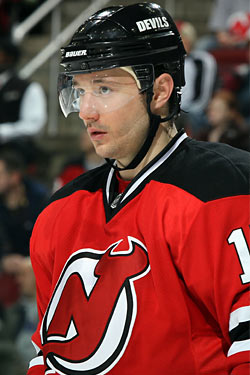
Now that the NHL has rejected Ilya Kovalchuk’s seventeen-year contract, the NHLPA has until 5 p.m. Monday to file a grievance and send the case to an independent arbitrator. To find out what exactly that arbitrator would be considering, we spoke with Matt Mitten, a law professor at Marquette University and director of Marquette Law School’s National Sports Law Institute. And though Mitten — an arbitrator himself, though not for the NHL — said he couldn’t give an opinion on which side has a stronger case without seeing all the evidence they’d present, he did provide some insight into what would likely go into the final decision.
Does the NHL need to prove, or can it prove, that neither side believes he’ll play until the end of the contract?
Well that’s almost impossible to answer, quite honestly … I suppose that one of the ways the arbitrator could look at this is that often times in contracts there’s an implied duty of good faith and fair dealing. If there’s evidence that no one really believed that the player would play to a certain age — let’s say the contract was for 30 years, maybe 60 years, something like that — then the question becomes, if you adopt that as a standard, would you use a subjective standard or an objective standard.
What’s the difference between the two?
Let’s say it goes to the provision that says no one can do anything to circumvent the intent of the salary cap. The question will become: Do you apply a subjective standard — that the club and the player and the agent knew he wasn’t going to play this long? That could be tough to prove. What did the parties actually believe, or what could be fairly inferred from the circumstances? But if it’s an objective standard, it’s just: Would a reasonably prudent club and player believe this player is likely to finish out the duration of his contract? That’s a little easier standard for the league to prove.
Is the question of whether they expect him to be playing at age 44 the biggest issue?
I would think that would be pretty important if there is a provision in there that said you can’t do anything to circumvent the cap. But I’m not sure how that would apply in this particular case. What is he, 27? That’s a long time to play NHL hockey, particularly if you’ve already been in the league for several years. But someone like Gordie Howe played, into what, his 50s? Very interesting case. Very interesting case.
Does it hurt the NHL’s case that the CBA does spell out rules about salary increases and decreases, and that this does follow them?
Yeah, because the arbitrator’s going to have to construe the terms of the CBA. And the more evidence that the terms of the contract are permitted, that there’s no express prohibition against this, and that it’s structured in such a way that they can point to a particular provision and say, “Hey, look, this is permitted,” then they’ve got a stronger argument that the NHL was trying to unilaterally prohibit it, and this would violate the terms of the CBA.
Would it factor in that similar contracts, like Marian Hossa’s, have already been approved?
Yeah, that’s certainly relevant evidence. Going back to it and saying, well, what’s really different about this contract here? I think that would be relevant evidence in determining what was really the intent of the CBA, since the express terms don’t say either you can or you can’t, although as you point out, it’s structured in such a way that it does fall within the amount by which the salary can be decreased from year to year.
Arbitration awards are not like appellate court opinions in that they have precedent. But arbitrators do look to that. It’s certainly something that would be considered. Depending on how that arbitration came out, you can bet one side or the other is really going to be relying on that to support their respective argument.